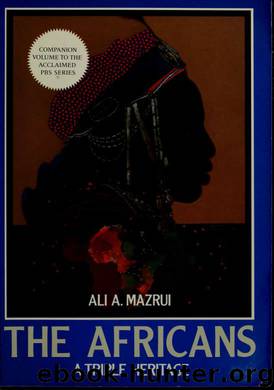The Africans : a triple heritage by Mazrui Ali AlAmin

Author:Mazrui, Ali AlAmin
Language: eng
Format: epub
Publisher: Boston : Little, Brown
Published: 1986-09-05T16:00:00+00:00
CHAPTER NINE
places such as Morocco and the Emirates of Nigeria. MiHtarised Islam has been practised in places such as Libya and Mali. Theocratic Islam has been tried out in Sudan, though not really under the Mullahs as in Iran.
However, Islam in Africa has gone beyond those three legs of king, warrior and priest. Muslim Senegal has proved to be one of the most resilient multi-party systems in Africa. It also showed a capacity for accepting a Christian head of state for the first two decades of independence - a degree of ecumenicalism greater than that achieved by the United States in the first two centuries of its independence. After all, Muslim Senegal accepted Leopold Senghor, a Catholic, for the first twenty years of Senegal's independence - while the United States is still unlikely to accept a practising Jew for President for at least another quarter of a century from now.
Whenever Nigeria has been under civilian rule, it has been under the leadership of a Muslim. Competitive multi-party elections in Nigeria have so far always resulted in a Muslim-led government. In the First Republic (1960-6) the effective political leadership came from a northern party led by Prime Minister Abubakar Tafawa Balewa and the Sardauna of Sokoto, Ahmadu Bello. In the Second Republic (1979—83), the leadership came not so much from a northern party as from a northern-dominated party under Al-Haji Shehu Shagari.
But in Nigeria, as elsewhere in Africa, the party-system is caught between the competing forces of anarchy and tyranny, and the competing pulls of militarism and civilian supremacy. The political aspirations of discipline as against freedom are caught in-between.
Africa's Civil-Military Pendulum
Africans are passing through a period when the economic vices of their governments seem to be regarded as more important than their political virtues. Nowhere is this better illustrated than in the fate of the Shagari Administration in Nigeria. The years 1979 to 1983 were perhaps the freest four years in Nigeria this century, certainly from the point of view of the open society and candid dissent. The names and reputations of the rulers were emphatically not spared. Perhaps nowhere else in the Third World were those in power more blatantly denounced in their own country as 'pirates and robbers' than as they were in Shagari's Nigeria. It is arguable that Shagari's four years were the golden years of press freedom in Nigeria. Sometimes the press came close to inciting violence. Sometimes opposition leaders actually did incite violence - and got away with it. If political dissent means anything, it reached its highest peak in Shagari's Nigeria, sometimes higher than in Western countries with their laws against incitement, against 'clear and present danger', and against disclosure of 'official secrets'.
Yet the same Shagari Administration was one of the most economically corrupt and incompetent in Nigeria's history. The nation's oil resources were rampantly abused, its finances substantially depleted, its laws of contract desecrated, its laws against corruption ignored, its teachers unpaid, its people
In Search of Stability 181
Download
This site does not store any files on its server. We only index and link to content provided by other sites. Please contact the content providers to delete copyright contents if any and email us, we'll remove relevant links or contents immediately.
The Vikings: Conquering England, France, and Ireland by Wernick Robert(79155)
Ali Pasha, Lion of Ioannina by Eugenia Russell & Eugenia Russell(39925)
The Vikings: Discoverers of a New World by Wernick Robert(36826)
The Conquerors (The Winning of America Series Book 3) by Eckert Allan W(36695)
Cecilia; Or, Memoirs of an Heiress — Volume 1 by Fanny Burney(32064)
Cecilia; Or, Memoirs of an Heiress — Volume 3 by Fanny Burney(31459)
Cecilia; Or, Memoirs of an Heiress — Volume 2 by Fanny Burney(31409)
Empire of the Sikhs by Patwant Singh(22769)
Hans Sturm: A Soldier's Odyssey on the Eastern Front by Gordon Williamson(18328)
The Secret History by Donna Tartt(18168)
Cat's cradle by Kurt Vonnegut(14763)
Sapiens: A Brief History of Humankind by Yuval Noah Harari(13993)
Pimp by Iceberg Slim(13781)
Talking to Strangers by Malcolm Gladwell(12881)
Norse Mythology by Gaiman Neil(12836)
Leonardo da Vinci by Walter Isaacson(12807)
Underground: A Human History of the Worlds Beneath Our Feet by Will Hunt(11840)
4 3 2 1: A Novel by Paul Auster(11794)
The Radium Girls by Kate Moore(11624)
